【中考夺分译林牛津版】2015英语中考夺分课件 基础巧过关-七年级下册 [Units 1-8]
文档属性
| 名称 | 【中考夺分译林牛津版】2015英语中考夺分课件 基础巧过关-七年级下册 [Units 1-8] | 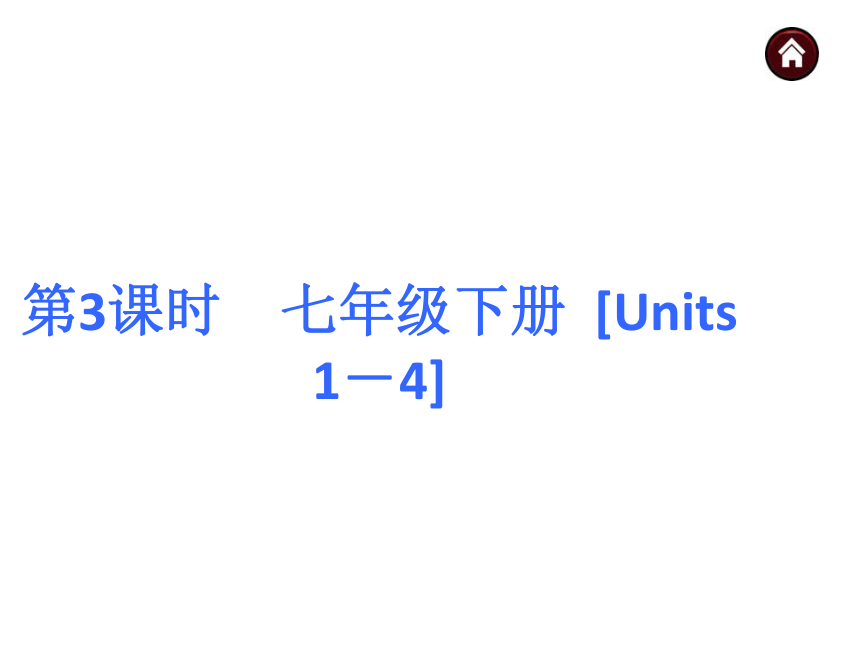 | |
| 格式 | zip | ||
| 文件大小 | 1.1MB | ||
| 资源类型 | 教案 | ||
| 版本资源 | 牛津译林版 | ||
| 科目 | 英语 | ||
| 更新时间 | 2015-04-13 10:55:35 | ||
图片预览

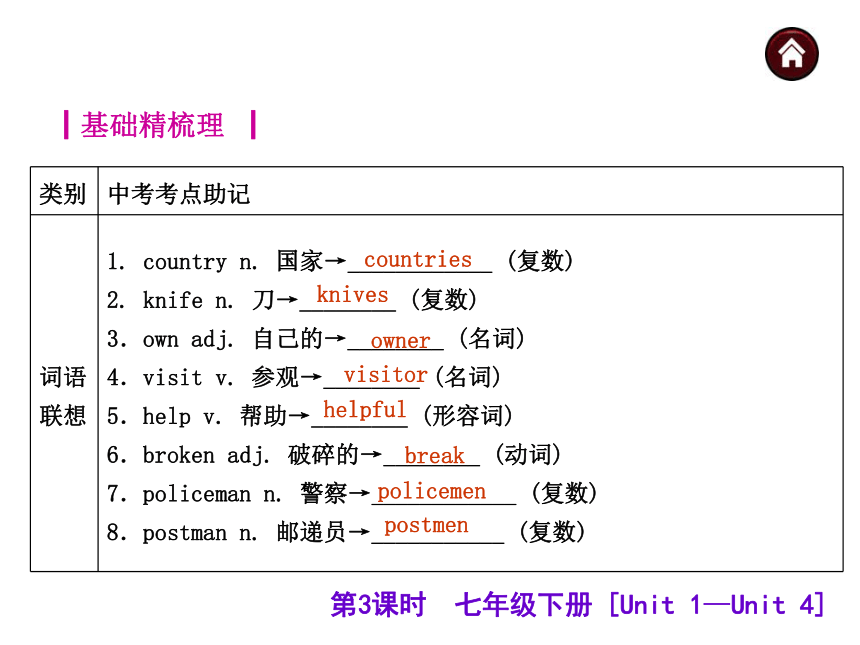
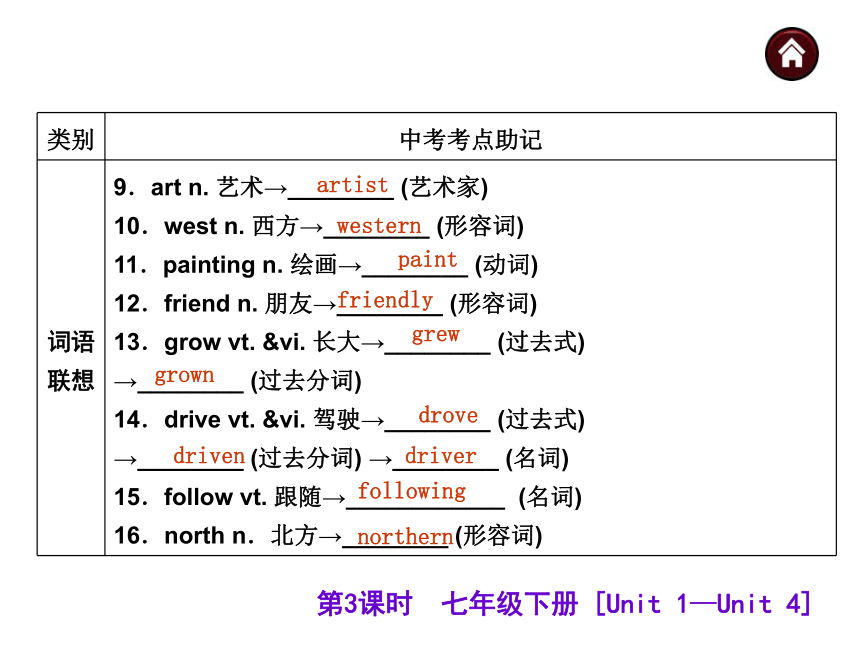
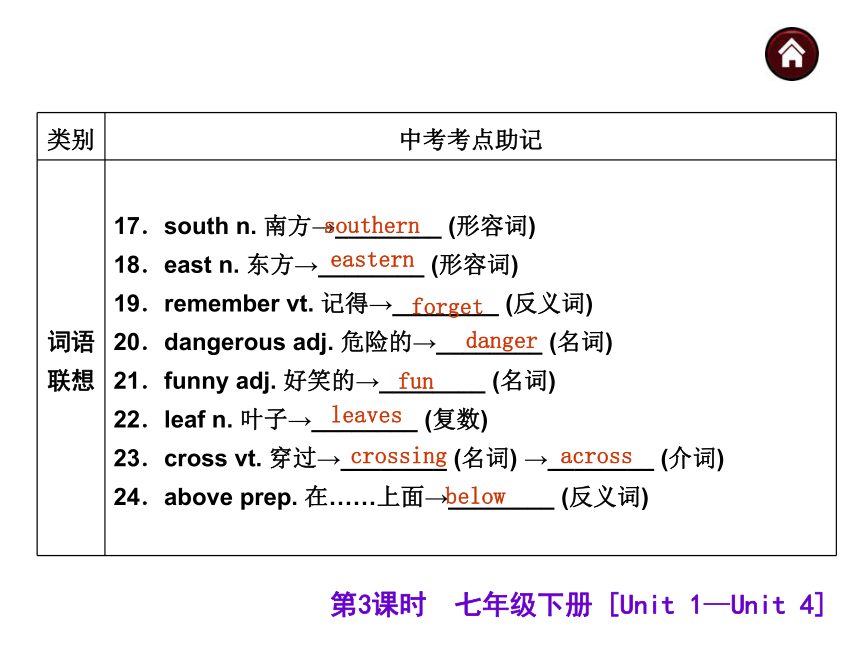
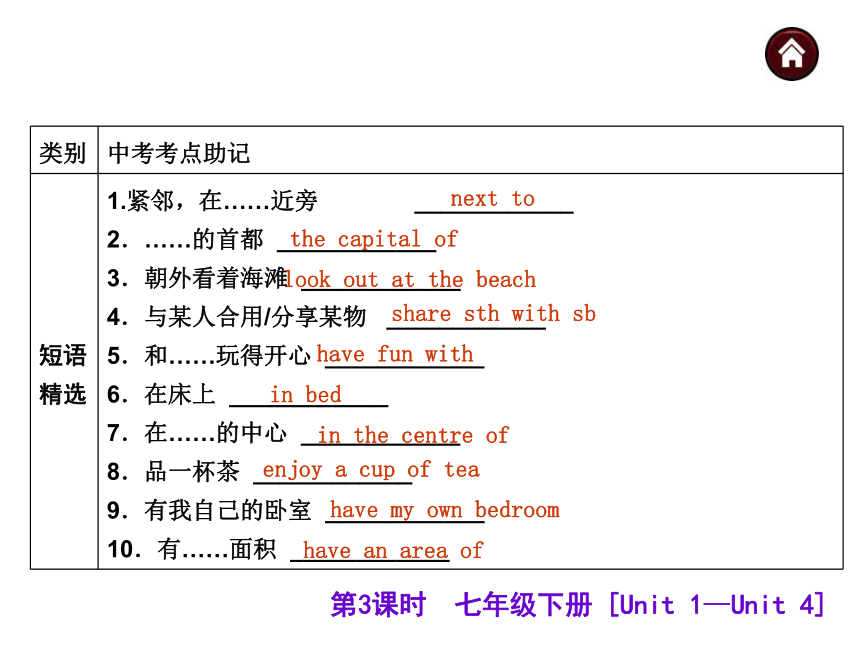
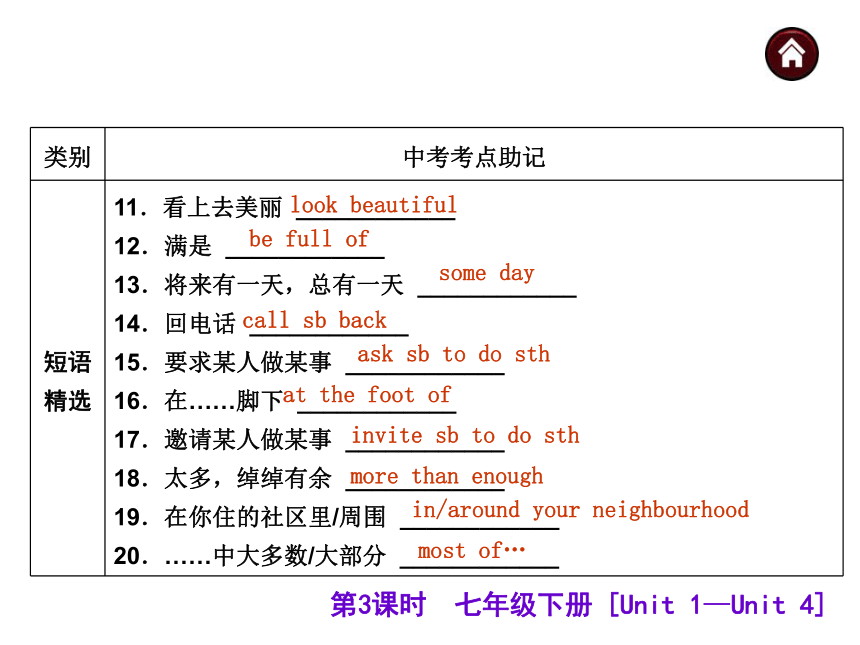
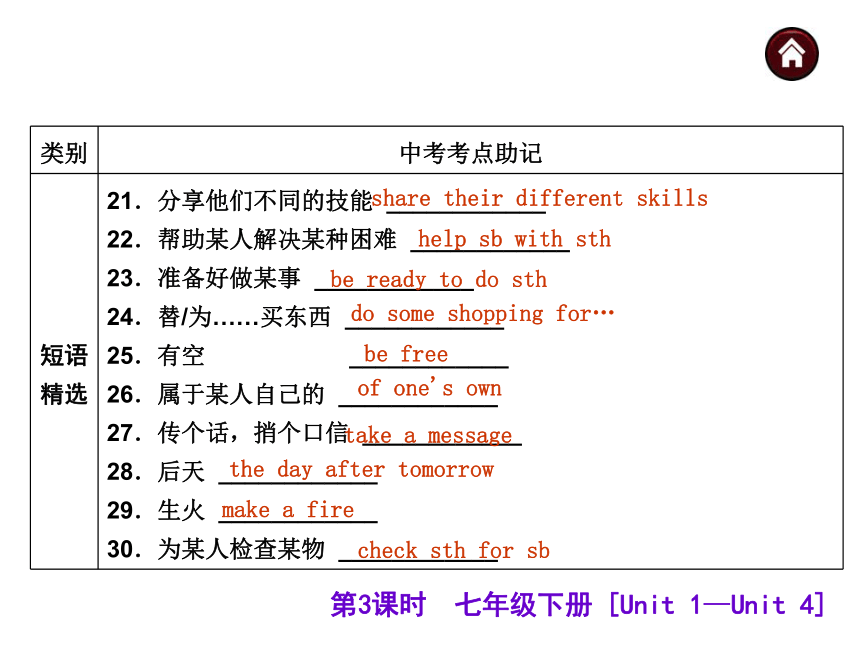
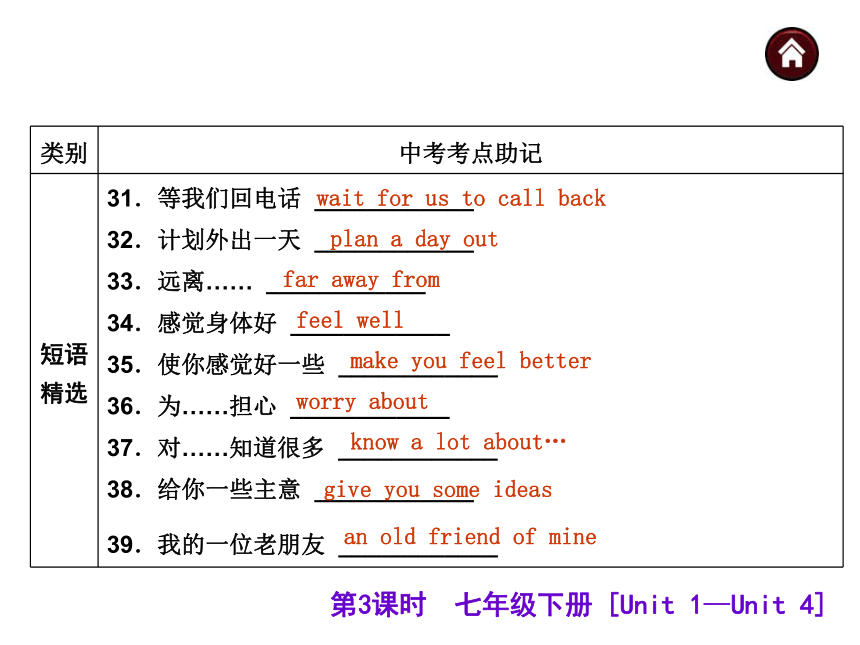
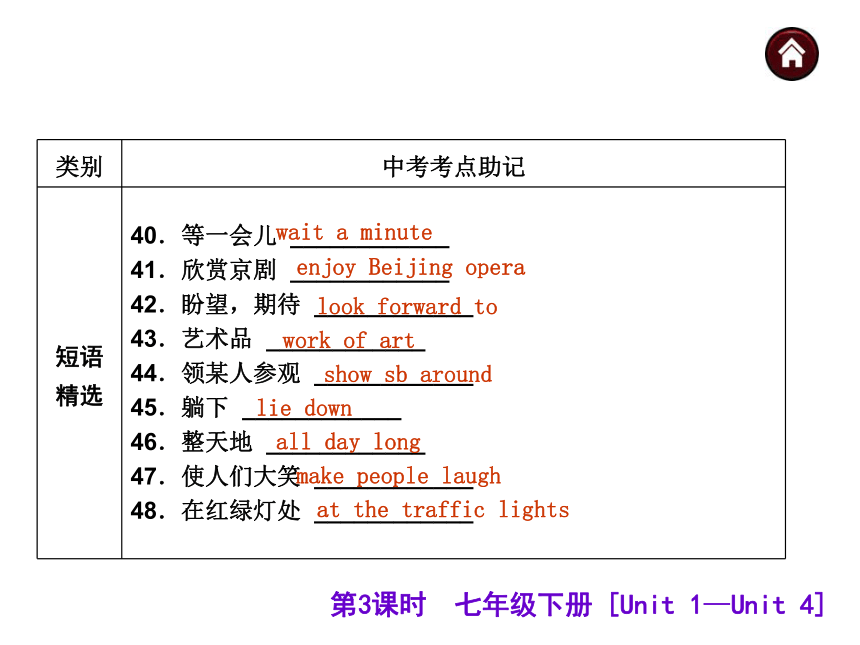
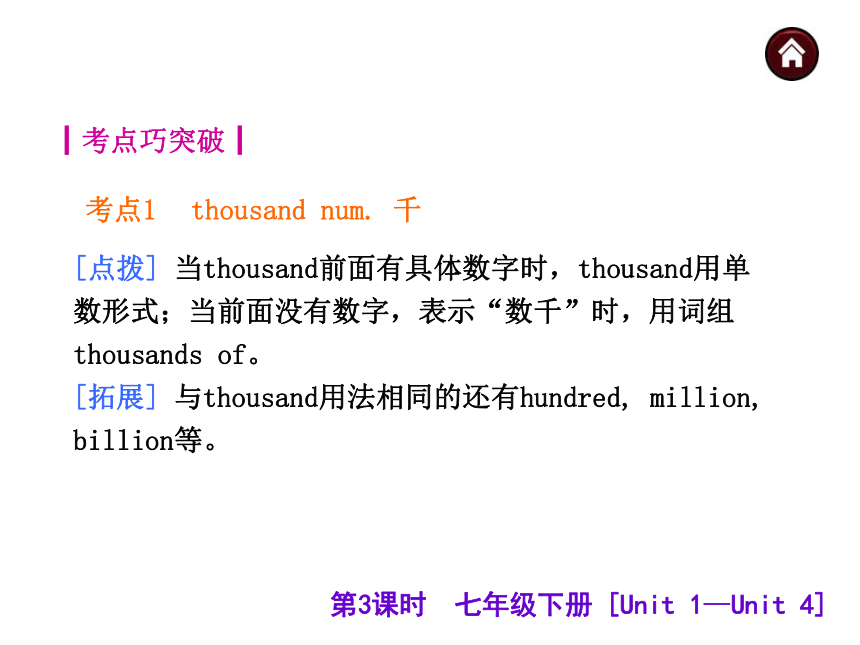
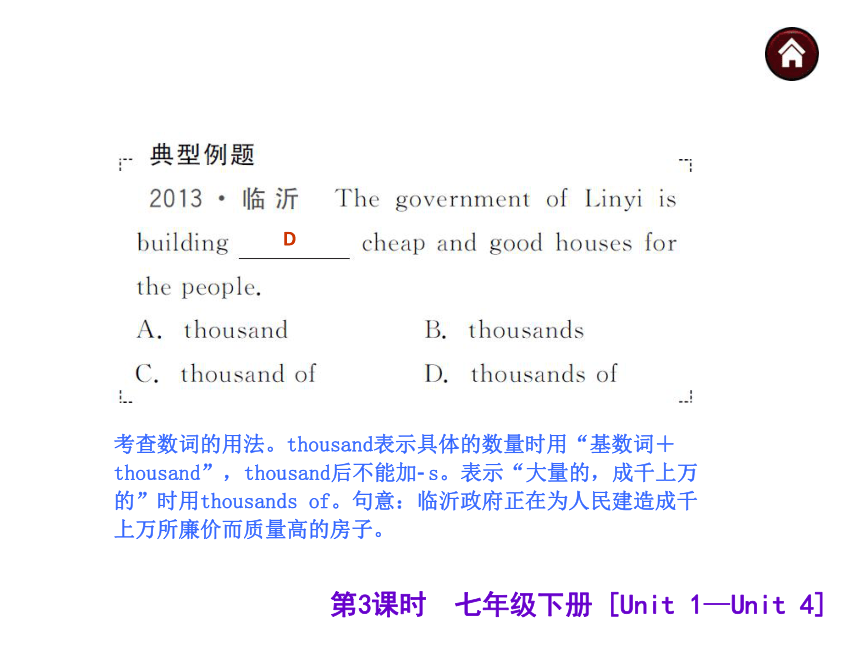
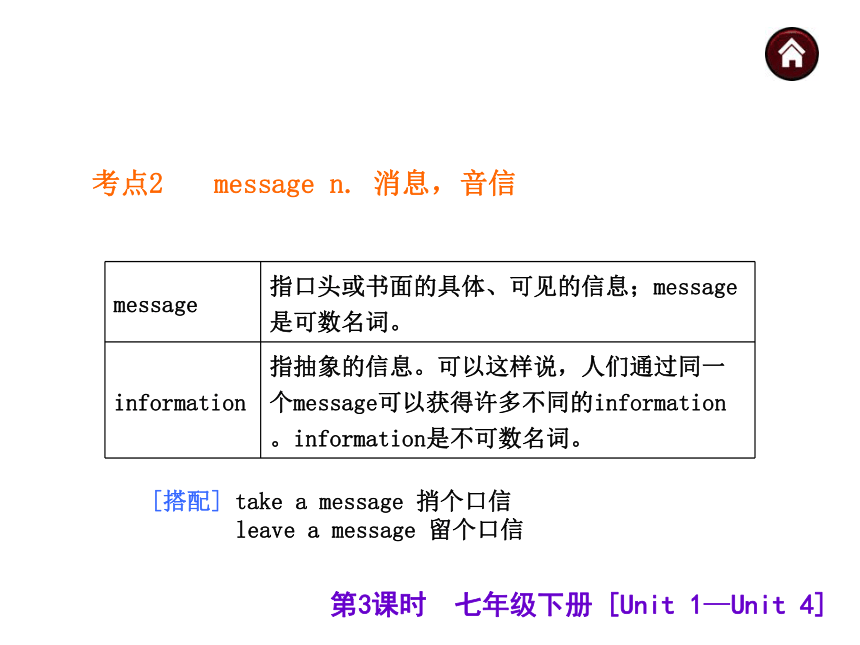
文档简介
课件84张PPT。第3课时 七年级下册 [Units 1-4]第3课时 七年级下册 [Unit 1—Unit 4]┃基础精梳理 ┃countries knives owner visitor helpful break policemen postmen 第3课时 七年级下册 [Unit 1—Unit 4]artist western paint friendlygrew grown drove driven driverfollowing northern 第3课时 七年级下册 [Unit 1—Unit 4]southerneastern forget danger funleaves crossing across below第3课时 七年级下册 [Unit 1—Unit 4] next to the capital of look out at the beachshare sth with sb have fun within bed in the centre of enjoy a cup of tea have my own bedroom have an area of 第3课时 七年级下册 [Unit 1—Unit 4]look beautifulbe full of some day call sb backask sb to do sth at the foot ofinvite sb to do sth more than enough in/around your neighbourhood most of… 第3课时 七年级下册 [Unit 1—Unit 4]share their different skillshelp sb with sth be ready to do sth do some shopping for… be freeof one's own take a messagethe day after tomorrow make a fire check sth for sb 第3课时 七年级下册 [Unit 1—Unit 4]wait for us to call back plan a day out far away from feel wellmake you feel better worry aboutknow a lot about… give you some ideas an old friend of mine 第3课时 七年级下册 [Unit 1—Unit 4]wait a minuteenjoy Beijing opera look forward to work of art show sb around lie down all day long make people laughat the traffic lights 第3课时 七年级下册 [Unit 1—Unit 4]┃考点巧突破┃考点1 thousand num. 千[点拨] 当thousand前面有具体数字时,thousand用单数形式;当前面没有数字,表示“数千”时,用词组thousands of。
[拓展] 与thousand用法相同的还有hundred, million, billion等。第3课时 七年级下册 [Unit 1—Unit 4]D 考查数词的用法。thousand表示具体的数量时用“基数词+thousand”,thousand后不能加-s。表示“大量的,成千上万的”时用thousands of。句意:临沂政府正在为人民建造成千上万所廉价而质量高的房子。 第3课时 七年级下册 [Unit 1—Unit 4]考点2 message n. 消息,音信 [搭配] take a message 捎个口信
leave a message 留个口信第3课时 七年级下册 [Unit 1—Unit 4]D thing意为“事情,东西”;message意为“信息”,为可数名词;information意为“信息”,为不可数名词。a lot of后接可数名词复数或不可数名词。故选D。第3课时 七年级下册 [Unit 1—Unit 4]考点3 invite vt. 邀请[点拨] invite的名词形式为invitation。
[搭配] invite sb to do sth邀请某人做某事第3课时 七年级下册 [Unit 1—Unit 4]nvite第3课时 七年级下册 [Unit 1—Unit 4]考点4 most of… ……中大多数/大部分 [点拨] most后可直接跟名词(可数或不可数),但不能直接跟有定冠词、指示代词或物主代词所修饰的名词,也不能直接跟人称代词宾格。遇到这些情况要用most of代替most。第3课时 七年级下册 [Unit 1—Unit 4]timemyof most第3课时 七年级下册 [Unit 1—Unit 4]考点5 far away from远离…… [点拨] far away用作表语或状语,away可以省略,因此,far away相当于far;far away from相当于far from。far (away)后不接宾语;far (away) from后一定要接宾语。
[辨析] away from/far from
两者区别主要在于far与away的区别:far是表示较笼统、模糊概念的“远”,前面不能有具体的数字;而away是表示具体的“远”。away from前常有具体数字。第3课时 七年级下册 [Unit 1—Unit 4]far from away from 第3课时 七年级下册 [Unit 1—Unit 4]考点6 give sb some ideas 给某人一些主意 [点拨] give后面跟双宾语,sb为间接宾语,sth为直接宾语。give sb sth=give sth to sb(当sth为代词时,只能用give sth to sb形式)。
[拓展] 类似用法的动词还有teach, buy, show, pass, cook, bring等。第3课时 七年级下册 [Unit 1—Unit 4]gives to第3课时 七年级下册 [Unit 1—Unit 4]考点7 look forward to 期待,盼望 [点拨] look forward to 中的to是介词,其后不能跟动词原形,只能跟名词、代词或v.-ing 形式作宾语。类似词组有pay attention to等。第3课时 七年级下册 [Unit 1—Unit 4]looking forward to第3课时 七年级下册 [Unit 1—Unit 4]考点8 drive vt.& vi. 驾车送(人);驾驶,开(车)[点拨] drive的名词形式为driver,意为“驾驶员”。
[搭配] drive to… 开车前往……
drive sb to… 开车送某人去……第3课时 七年级下册 [Unit 1—Unit 4]driver第3课时 七年级下册 [Unit 1—Unit 4]考点9 remember vt. 记得,记住 [搭配] remember to do sth 记住要做某事
remember doing sth 记得已经做过某事
[拓展] remember的反义词是forget;remember=not forget。
forget to do sth忘记做某事
forget doing sth忘记做过某事第3课时 七年级下册 [Unit 1—Unit 4]B remember to do sth表示“记住去做某事”。故选B。第3课时 七年级下册 [Unit 1—Unit 4]考点10 hear the birds sing 听到鸟儿唱歌 [点拨] hear sb doing sth意为“听到某人正在做某事”,强调动作正在进行;hear sb do sth意为“听到某人做某事”,强调动作的全过程。
[拓展] 类似的感官动词有see, watch, feel等,它们可接do sth,也可接doing sth,但两者含义不同。第3课时 七年级下册 [Unit 1—Unit 4]D hear sb doing sth表示“听到某人正在做某事”;hear sb do sth 表示“听到某人做某事”。由“When I passed the classroom”可知,强调动作正在发生,故选D。 第3课时 七年级下册 [Unit 1—Unit 4]考点11 leaf n. (树、菜)叶 [点拨] 以f或fe结尾的可数名词,复数形式一般要把f或fe改为v,再加-es。如:
leaf—leaves life—lives knife—knives
wife—wives wolf—wolves第3课时 七年级下册 [Unit 1—Unit 4]leaves 以f或fe结尾的可数名词,复数形式一般要把f或fe改为v,再加-es。 第3课时 七年级下册 [Unit 1—Unit 4]考点12 make people laugh 使人们大笑 [点拨] make是使役动词,后接动词原形、形容词或名词作宾语补足语。第3课时 七年级下册 [Unit 1—Unit 4] D make sb do sth意为“使某人做某事”;“make sb+adj.” 意为“使某人……”,故选D。第3课时 七年级下册 [Unit 1—Unit 4]考点13 Would you like…? 你想要/愿意……吗?[点拨] “Would you like…?” 用于礼貌地提出建议、发出邀请或询问对方的意愿,没有人称和数的变化。
[拓展] 针对“Would you like…?”的回答 [搭配] would like的几种常用句型
(1)would like sth 想要某物
(2)would like to do sth 想要做某事
(3)would like sb to do sth 想要某人做某事第3课时 七年级下册 [Unit 1—Unit 4]A C 第3课时 七年级下册 [Unit 1—Unit 4] (1) “Would you like sth?”为征求对方意见的句式。肯定回答:Yes, please.否定回答: No, thanks.
(2) “Would you like to do sth?”用于征求对方的意见或建议,意为“你乐意做……吗?”肯定回答:Yes, I'd love/like to.否定回答:I'd like/love to, but… 第3课时 七年级下册 [Unit 1—Unit 4]┃智能双提升┃基础过关Ⅰ.根据汉语提示完成句子
1. I just want to lie on the ________ (海滩) in the sun.
2. Millie's schoolbag is heavy. It is ________ (满的) of books.
3.China has an ________ (面积) of over 9,600,000 square kilometres.
4.The twins work in the post office, and both of them are ________ (邮递员).
5.She often looks for some ________ (信息) about fashion on the Internet.beach full area postmeninformation第3课时 七年级下册 [Unit 1—Unit 4]Ⅱ.用所给词的适当形式填空
1. Don't play with the ________ (knife). They may hurt you.
2.Mr Black has a daughter. Today is her ________ (nine) birthday.
3.The ________ (visit) to Nanjing all think it's a beautiful city.
4.It is ________ (danger) to swim in a river.
5.Mum always tells me to walk ________ (cross) the road carefully. knives ninth visitorsdangerous across第3课时 七年级下册 [Unit 1—Unit 4]Ⅲ.句型转换
1. Take the first turning on the right. (改为同义句)
________ ________ ________ the first turning.
2.Daniel usually goes to school by bus. (改为同义句)
Daniel usually ________ ________ ________ to school.
3.It will take me about_half_an_hour to get there. (对画线部分提问)
________ ________ ________ it take you to get there?
4.He opens the box but finds nothing. (改为同义句)
He opens the box but ________ ________ ________.
5.You can't play with fire. (改为祈使句)
________ ________ with fire.Turn right at takes a busHow long will doesn't find anything Don't play 第3课时 七年级下册 [Unit 1—Unit 4]Ⅳ.根据汉语意思完成句子
1. 今天阳光明媚,我将带你参观我的家乡。
It's sunny today. I'll ________ ________ ________ my hometown.
2. 在第三个十字路口向左拐,你会发现那家医院。
________ ________ ________ ________ on the left, and you'll find that hospital.
3. 我妈妈要我晚上不看电视。
My mother ________ ________ not ________ ________ ________ in the evening.
4.我们都在盼望着庆祝春节。
We are all ________ ________ ________ ________ the Spring Festival.
5.这个公园是散步的一个好地方。
The park is ________ ________ ________ ________ go for a walk.show you around Take the third crossing asks me to watch TVlooking forward to celebrating a good place to 第3课时 七年级下册 [Unit 1—Unit 4]单项选择
1.[2014·梅州] The sinking accident in Korea happened ________ April 16, 2014 and ________ people lost their lives.
A.in; hundreds
B.on; many hundreds
C.on; hundreds of
D.at; many hundred of中考透视 C 考查介词和数词。句意:韩国沉船事故发生在2014年4月16日,数百人丧生。2014年4月16日是具体日期,所以用介词on;表示“数百”用hundreds of,故选C。第3课时 七年级下册 [Unit 1—Unit 4]2.[2014·呼和浩特] When Peter comes, please ask him to leave a ________.
A.notice B.message
C.sentence D.informationB 考查名词词义辨析。句意:当彼得来的时候,请叫他留下个口信。notice意为“通知”;message意为“消息,口信”;sentence意为“句子”;information意为“信息”。第3课时 七年级下册 [Unit 1—Unit 4]3.[2014·泸州] Please remember ________ your notebook here tomorrow.
A.brings B.brought
C.bringing D.to bring D考查非谓语动词的用法。句意:请记住明天带你的笔记本来这儿。remember to do sth意为“记得去做某事”,事情还没做;remember doing sth意为“记得做过某事”,事情已经做了。第3课时 七年级下册 [Unit 1—Unit 4]
4.[2014·广元] —What's the matter with my daughter, doctor?
—Just a little cold. There's ________ serious, Madam.
A.anything B.something
C.nothingC考查动词的词义辨析。句意:“琳达,你认为你的学校怎么样?”“它是一个能使我们为将来做好准备的好地方。”promise意为“保证,许诺”;prove意为“证实,证明”;prepare意为“准备”;present意为“赠送”。prepare…for…意为“为……准备……”。第4课时 七年级下册 [Units 5-8]第4课时 七年级下册 [Unit 5—Unit 8]┃基础精梳理 ┃usually sudden stranger left left wonderful careful care strong 第4课时 七年级下册 [Unit 5—Unit 8]surprising surpriserode ridden fell fallenhit hit lockexciting excite excitement decision 第4课时 七年级下册 [Unit 5—Unit 8]forgot forgotten able sent sent hurt hurt lost lost careless mice 第4课时 七年级下册 [Unit 5—Unit 8]weight built built pianos taught taught held held noisy noisily quick第4课时 七年级下册 [Unit 5—Unit 8]from birth stop doing sth sleep with their eyes openas usual sit downturn around on one's/the way say to oneself pick up run away the day before yesterday learn about/of 第4课时 七年级下册 [Unit 5—Unit 8]be afraid of not…any more hear of the other day at the same timestay at home all over the world at leastget one's name from ask forhurry up stand up 第4课时 七年级下册 [Unit 5—Unit 8]look up run after get away go through on the other side put up stay outside all night have a long history from then on too…to… believe it or notlook out 第4课时 七年级下册 [Unit 5—Unit 8]give a seat to sbclean up raise money for collect sth for sb pay for save…fromput out next door in hospitalat that moment be careful with sthcall for help 第4课时 七年级下册 [Unit 5—Unit 8]make a call on one's mobile by the way no problemdo/try one's best do well in at the age of take part in lose one's way hear fromlook after/take care of all the time grow up 第4课时 七年级下册 [Unit 5—Unit 8]┃考点巧突破┃考点1 happen/take place happen与take place都作“发生”讲,前者指碰巧,具有偶然性,而后者指事件的发生有某种原因或经过事先安排。happen与take place都不能用于被动语态。第4课时 七年级下册 [Unit 5—Unit 8]happenedwhentheaccident第4课时 七年级下册 [Unit 5—Unit 8]考点2 decide vt.& vi. 决定 [点拨] decide的名词形式为decision。
make a decision 做决定
decide to do sth=make a decision to do sth第4课时 七年级下册 [Unit 5—Unit 8]B decide to do sth意为“决定做某事”。第4课时 七年级下册 [Unit 5—Unit 8]考点3 arrive/get/reach第4课时 七年级下册 [Unit 5—Unit 8]D 考查词义辨析。arrive in意为“到达某地”。A项时态不对;reach后接地点名词时,不加介词,排除B;get意为“到达”时,先加介词to再接地点名词;get to意为“到达”。第4课时 七年级下册 [Unit 5—Unit 8]考点4 surprised adj. 吃惊的,惊讶的 [点拨] surprised的主语一般是人,指人对某事物“感到吃惊”。be surprised to do sth=be surprised at (doing) sth,意为“对(做)某事感到惊讶”。
[拓展] surprising意为“令人惊讶的”,一般用来修饰物。surprise作动词时,意为“使……惊讶”;作名词时,意为“惊讶,惊喜”,常用搭配to one's surprise,意为“令某人吃惊的是……”。第4课时 七年级下册 [Unit 5—Unit 8] D 考查形容词词义辨析。句意:粉丝们知道他们最喜爱的歌星惠特妮·休斯顿的死亡后很吃惊。glad意为“高兴的”;angry意为“生气的”;excited意为“兴奋的”;surprised意为“惊讶的”。第4课时 七年级下册 [Unit 5—Unit 8]考点5 afraid adj. 害怕的[点拨] be afraid to do sth 意为“害怕做某事”,着重指“因害怕而不敢去做某事”。be afraid of doing sth意为“害怕做某事”,表示“担心某事可能发生”。“be afraid+that从句”表示引出不好的消息或带有歉意的回绝。I'm afraid not/so意为“恐怕不是这样/是这样”,常用来回答对方的问题,语气较委婉。
第4课时 七年级下册 [Unit 5—Unit 8]D 句意:“劳驾,这家博物馆是每天开放吗?”“恐怕不是的。它只在周一到周五开放。”第4课时 七年级下册 [Unit 5—Unit 8]考点6 protect vt. 保护 [点拨] protect+宾语+against/from,意为“保护……不受……”。
[拓展] protection n. 保护,防卫
protector n. 保护人(或组织、装置等)
protective adj. 保护的,防护的第4课时 七年级下册 [Unit 5—Unit 8]against/fromprotect第4课时 七年级下册 [Unit 5—Unit 8]考点7 take part in 参加 [辨析] join/take part in/attend 第4课时 七年级下册 [Unit 5—Unit 8]C第4课时 七年级下册 [Unit 5—Unit 8]考点8 noise/sound/voice [拓展] noisy adj. 嘈杂的,喧闹的
noisily adv. 吵闹地,喧闹地
make a noise 制造噪声
make a lot of noise 制造很多噪声第4课时 七年级下册 [Unit 5—Unit 8] noise 第4课时 七年级下册 [Unit 5—Unit 8]考点9 lose vt. 丢失;迷失[点拨] lose—lost(过去式)—lost(过去分词)
[搭配] lose one's way=get lost迷路第4课时 七年级下册 [Unit 5—Unit 8]will get/be lost; will lose your way第4课时 七年级下册 [Unit 5—Unit 8]考点10 No problem. 没问题。 [点拨] no problem可以用在不同的场合。当表示“愿意相助或事情容易做”时可以说no problem,意为“没问题”;回答别人的道谢或道歉时,也可以说no problem,意为“不客气”。第4课时 七年级下册 [Unit 5—Unit 8]B 考查日常用语的用法。that's right意为“对”;no problem意为“没问题”;never mind意为“没关系,不要紧”;that's OK意为“没关系”。句意:“我自己完成这项工作有很大的困难,你能帮助我吗?”“没问题。”第4课时 七年级下册 [Unit 5—Unit 8]┃智能双提升┃基础过关Ⅰ.根据汉语提示完成句子
1.This morning Daniel got up late, so he ________ (匆忙) to school without breakfast.
2. Walk ________ (穿过) the forest, and you will get to the gate of the park.
3.One of the ________ (兔子) has a watch.
4.We all know that the moon moves around the ________ (地球).
5.I ________ (想知道) why he is late for school again. Internet.hurried through rabbits earth wonder 第4课时 七年级下册 [Unit 5—Unit 8]Ⅱ.用所给词的适当形式填空
1. He has the ________ (able) to finish the work on time.
2.We can't see anything without ________ (open) eyes.
3. Tom is clever, but sometimes he does his homework ________ (care).
4.I told the children ________ (not go) out. They had better stay at home.
5.She ________ (teach) us to sing English songs just now.
6. He is afraid of ________ (fail) in the test. Let's help him.
7. Alice was ________ (surprise) to see the rabbit passing by.
8. Five days ________ (late), he came to my home again and took away that computer.
9. I don't know what ________ (happen) in a hundred years.
10. It's too ________ (noise). Please turn off the radio.ability opening carelessly not to go taught failingsurprised later will hapennoisy 第4课时 七年级下册 [Unit 5—Unit 8]Ⅲ.句型转换
1. It's very hot. Don't close the window. (改为同义句)
It's very hot. Please ________ the window ________.
2. It took us two days to finish this work. (改为同义句)
We ________ two days ________ this work.
3. They left the park quickly. (对画线部分提问)
________ did they ________ the park?
4.The boy is five years old. He couldn't find his way yesterday.(改为同义句)
The ________ boy ________ his way yesterday.
5.They found_six_dogs there in June. (对画线部分提问)
________ did they ________ there in June?keep open spent finishing How leave five-year-old lostWhat do 第4课时 七年级下册 [Unit 5—Unit 8]Ⅳ.根据汉语意思完成句子
1.他刚才自言自语并迅速地跑开了。
He ________ ________ ________ and ________ ________ quickly just now.
2. 我可以同时看电视和做作业吗?
Can I watch TV and do my homework ________ ________ ________ ________?
3. 我们应该远离不健康的书籍。
We should ________ ________ ________ unhealthy books.
4.他们不知道怎样照顾它。
They don't know ________ ________ ________ ________/________ ________ ________ ________ ________ it.
5.小心火是很重要的。
It is very important ________ ________ ________ ________ fire.said to himself ran away time atthesamefrom keep awayofhowtolookafterhowto takecarewithtobecareful第4课时 七年级下册 [Unit 5—Unit 8]单项选择
1.[2014·鄂州] —Everyone must ________ the security check(安检) before getting on the plane at the airport.
—Yes. It's necessary to ensure the passengers' safety.
A.get through B.get across
C.go through D.go across中考透视 C 句意:“每个人在机场登机前必须要过安检。”“是的,保证乘客的安全是必须的。”go through意为 “穿过”。第4课时 七年级下册 [Unit 5—Unit 8]2.[2014·绥化] —Who was the first to ________ school yesterday?
—Tom was.
A.reach B.get C.arriveA 考查动词用法辨析。句意:“昨天谁是第一个到学校的?”“汤姆。”reach为及物动词,后直接接地点;get为不及物动词,不直接接宾语;arrive为不及物动词,不直接接宾语。第4课时 七年级下册 [Unit 5—Unit 8]3.[2014·平凉] The boy didn't sleep well last night because of the ________ from the factory.
A.voice B.noise C.music D.song B考查名词词义辨析。句意:因为来自工厂的噪声,那个男孩昨晚没睡好。voice意为“嗓音”;noise意为“噪声”;music意为“音乐”;song意为“歌”。 第4课时 七年级下册 [Unit 5—Unit 8]
4.[2014·淮安] The 18th Jiangsu Provincial Games will ________ in September. Many students want to be volunteers.
A.take place B.take part
C.take action D.take careA考查动词词组辨析。句意:第18届江苏省的运动会将在九月份举行。许多学生想做志愿者。take place意为“举行”;take part意为“参加”;take action意为“采取行动”;take care意为“注意”。故答案为A。第4课时 七年级下册 [Unit 5—Unit 8]
5.[2014·云南] —Oh, dear! Your room is untidy.
—Sorry, Mum. I'll ________.
A.set it up B.clean it up
C.put it up D.look it upB考查动词短语辨析。set up意为“建立”;clean up意为“打扫”;put up意为“张贴;举起;搭建”;look up意为“查找”。由“Your room is untidy.”可知选B。第4课时 七年级下册 [Unit 5—Unit 8]6.[2014·上海] Harry has decided ________ an online shop after graduating from school.
A.open B.to open
C.opened D.openingB考查非谓语动词的用法。decide to do sth意为“决定做某事”,故选B。
[拓展] 与thousand用法相同的还有hundred, million, billion等。第3课时 七年级下册 [Unit 1—Unit 4]D 考查数词的用法。thousand表示具体的数量时用“基数词+thousand”,thousand后不能加-s。表示“大量的,成千上万的”时用thousands of。句意:临沂政府正在为人民建造成千上万所廉价而质量高的房子。 第3课时 七年级下册 [Unit 1—Unit 4]考点2 message n. 消息,音信 [搭配] take a message 捎个口信
leave a message 留个口信第3课时 七年级下册 [Unit 1—Unit 4]D thing意为“事情,东西”;message意为“信息”,为可数名词;information意为“信息”,为不可数名词。a lot of后接可数名词复数或不可数名词。故选D。第3课时 七年级下册 [Unit 1—Unit 4]考点3 invite vt. 邀请[点拨] invite的名词形式为invitation。
[搭配] invite sb to do sth邀请某人做某事第3课时 七年级下册 [Unit 1—Unit 4]nvite第3课时 七年级下册 [Unit 1—Unit 4]考点4 most of… ……中大多数/大部分 [点拨] most后可直接跟名词(可数或不可数),但不能直接跟有定冠词、指示代词或物主代词所修饰的名词,也不能直接跟人称代词宾格。遇到这些情况要用most of代替most。第3课时 七年级下册 [Unit 1—Unit 4]timemyof most第3课时 七年级下册 [Unit 1—Unit 4]考点5 far away from远离…… [点拨] far away用作表语或状语,away可以省略,因此,far away相当于far;far away from相当于far from。far (away)后不接宾语;far (away) from后一定要接宾语。
[辨析] away from/far from
两者区别主要在于far与away的区别:far是表示较笼统、模糊概念的“远”,前面不能有具体的数字;而away是表示具体的“远”。away from前常有具体数字。第3课时 七年级下册 [Unit 1—Unit 4]far from away from 第3课时 七年级下册 [Unit 1—Unit 4]考点6 give sb some ideas 给某人一些主意 [点拨] give后面跟双宾语,sb为间接宾语,sth为直接宾语。give sb sth=give sth to sb(当sth为代词时,只能用give sth to sb形式)。
[拓展] 类似用法的动词还有teach, buy, show, pass, cook, bring等。第3课时 七年级下册 [Unit 1—Unit 4]gives to第3课时 七年级下册 [Unit 1—Unit 4]考点7 look forward to 期待,盼望 [点拨] look forward to 中的to是介词,其后不能跟动词原形,只能跟名词、代词或v.-ing 形式作宾语。类似词组有pay attention to等。第3课时 七年级下册 [Unit 1—Unit 4]looking forward to第3课时 七年级下册 [Unit 1—Unit 4]考点8 drive vt.& vi. 驾车送(人);驾驶,开(车)[点拨] drive的名词形式为driver,意为“驾驶员”。
[搭配] drive to… 开车前往……
drive sb to… 开车送某人去……第3课时 七年级下册 [Unit 1—Unit 4]driver第3课时 七年级下册 [Unit 1—Unit 4]考点9 remember vt. 记得,记住 [搭配] remember to do sth 记住要做某事
remember doing sth 记得已经做过某事
[拓展] remember的反义词是forget;remember=not forget。
forget to do sth忘记做某事
forget doing sth忘记做过某事第3课时 七年级下册 [Unit 1—Unit 4]B remember to do sth表示“记住去做某事”。故选B。第3课时 七年级下册 [Unit 1—Unit 4]考点10 hear the birds sing 听到鸟儿唱歌 [点拨] hear sb doing sth意为“听到某人正在做某事”,强调动作正在进行;hear sb do sth意为“听到某人做某事”,强调动作的全过程。
[拓展] 类似的感官动词有see, watch, feel等,它们可接do sth,也可接doing sth,但两者含义不同。第3课时 七年级下册 [Unit 1—Unit 4]D hear sb doing sth表示“听到某人正在做某事”;hear sb do sth 表示“听到某人做某事”。由“When I passed the classroom”可知,强调动作正在发生,故选D。 第3课时 七年级下册 [Unit 1—Unit 4]考点11 leaf n. (树、菜)叶 [点拨] 以f或fe结尾的可数名词,复数形式一般要把f或fe改为v,再加-es。如:
leaf—leaves life—lives knife—knives
wife—wives wolf—wolves第3课时 七年级下册 [Unit 1—Unit 4]leaves 以f或fe结尾的可数名词,复数形式一般要把f或fe改为v,再加-es。 第3课时 七年级下册 [Unit 1—Unit 4]考点12 make people laugh 使人们大笑 [点拨] make是使役动词,后接动词原形、形容词或名词作宾语补足语。第3课时 七年级下册 [Unit 1—Unit 4] D make sb do sth意为“使某人做某事”;“make sb+adj.” 意为“使某人……”,故选D。第3课时 七年级下册 [Unit 1—Unit 4]考点13 Would you like…? 你想要/愿意……吗?[点拨] “Would you like…?” 用于礼貌地提出建议、发出邀请或询问对方的意愿,没有人称和数的变化。
[拓展] 针对“Would you like…?”的回答 [搭配] would like的几种常用句型
(1)would like sth 想要某物
(2)would like to do sth 想要做某事
(3)would like sb to do sth 想要某人做某事第3课时 七年级下册 [Unit 1—Unit 4]A C 第3课时 七年级下册 [Unit 1—Unit 4] (1) “Would you like sth?”为征求对方意见的句式。肯定回答:Yes, please.否定回答: No, thanks.
(2) “Would you like to do sth?”用于征求对方的意见或建议,意为“你乐意做……吗?”肯定回答:Yes, I'd love/like to.否定回答:I'd like/love to, but… 第3课时 七年级下册 [Unit 1—Unit 4]┃智能双提升┃基础过关Ⅰ.根据汉语提示完成句子
1. I just want to lie on the ________ (海滩) in the sun.
2. Millie's schoolbag is heavy. It is ________ (满的) of books.
3.China has an ________ (面积) of over 9,600,000 square kilometres.
4.The twins work in the post office, and both of them are ________ (邮递员).
5.She often looks for some ________ (信息) about fashion on the Internet.beach full area postmeninformation第3课时 七年级下册 [Unit 1—Unit 4]Ⅱ.用所给词的适当形式填空
1. Don't play with the ________ (knife). They may hurt you.
2.Mr Black has a daughter. Today is her ________ (nine) birthday.
3.The ________ (visit) to Nanjing all think it's a beautiful city.
4.It is ________ (danger) to swim in a river.
5.Mum always tells me to walk ________ (cross) the road carefully. knives ninth visitorsdangerous across第3课时 七年级下册 [Unit 1—Unit 4]Ⅲ.句型转换
1. Take the first turning on the right. (改为同义句)
________ ________ ________ the first turning.
2.Daniel usually goes to school by bus. (改为同义句)
Daniel usually ________ ________ ________ to school.
3.It will take me about_half_an_hour to get there. (对画线部分提问)
________ ________ ________ it take you to get there?
4.He opens the box but finds nothing. (改为同义句)
He opens the box but ________ ________ ________.
5.You can't play with fire. (改为祈使句)
________ ________ with fire.Turn right at takes a busHow long will doesn't find anything Don't play 第3课时 七年级下册 [Unit 1—Unit 4]Ⅳ.根据汉语意思完成句子
1. 今天阳光明媚,我将带你参观我的家乡。
It's sunny today. I'll ________ ________ ________ my hometown.
2. 在第三个十字路口向左拐,你会发现那家医院。
________ ________ ________ ________ on the left, and you'll find that hospital.
3. 我妈妈要我晚上不看电视。
My mother ________ ________ not ________ ________ ________ in the evening.
4.我们都在盼望着庆祝春节。
We are all ________ ________ ________ ________ the Spring Festival.
5.这个公园是散步的一个好地方。
The park is ________ ________ ________ ________ go for a walk.show you around Take the third crossing asks me to watch TVlooking forward to celebrating a good place to 第3课时 七年级下册 [Unit 1—Unit 4]单项选择
1.[2014·梅州] The sinking accident in Korea happened ________ April 16, 2014 and ________ people lost their lives.
A.in; hundreds
B.on; many hundreds
C.on; hundreds of
D.at; many hundred of中考透视 C 考查介词和数词。句意:韩国沉船事故发生在2014年4月16日,数百人丧生。2014年4月16日是具体日期,所以用介词on;表示“数百”用hundreds of,故选C。第3课时 七年级下册 [Unit 1—Unit 4]2.[2014·呼和浩特] When Peter comes, please ask him to leave a ________.
A.notice B.message
C.sentence D.informationB 考查名词词义辨析。句意:当彼得来的时候,请叫他留下个口信。notice意为“通知”;message意为“消息,口信”;sentence意为“句子”;information意为“信息”。第3课时 七年级下册 [Unit 1—Unit 4]3.[2014·泸州] Please remember ________ your notebook here tomorrow.
A.brings B.brought
C.bringing D.to bring D考查非谓语动词的用法。句意:请记住明天带你的笔记本来这儿。remember to do sth意为“记得去做某事”,事情还没做;remember doing sth意为“记得做过某事”,事情已经做了。第3课时 七年级下册 [Unit 1—Unit 4]
4.[2014·广元] —What's the matter with my daughter, doctor?
—Just a little cold. There's ________ serious, Madam.
A.anything B.something
C.nothingC考查动词的词义辨析。句意:“琳达,你认为你的学校怎么样?”“它是一个能使我们为将来做好准备的好地方。”promise意为“保证,许诺”;prove意为“证实,证明”;prepare意为“准备”;present意为“赠送”。prepare…for…意为“为……准备……”。第4课时 七年级下册 [Units 5-8]第4课时 七年级下册 [Unit 5—Unit 8]┃基础精梳理 ┃usually sudden stranger left left wonderful careful care strong 第4课时 七年级下册 [Unit 5—Unit 8]surprising surpriserode ridden fell fallenhit hit lockexciting excite excitement decision 第4课时 七年级下册 [Unit 5—Unit 8]forgot forgotten able sent sent hurt hurt lost lost careless mice 第4课时 七年级下册 [Unit 5—Unit 8]weight built built pianos taught taught held held noisy noisily quick第4课时 七年级下册 [Unit 5—Unit 8]from birth stop doing sth sleep with their eyes openas usual sit downturn around on one's/the way say to oneself pick up run away the day before yesterday learn about/of 第4课时 七年级下册 [Unit 5—Unit 8]be afraid of not…any more hear of the other day at the same timestay at home all over the world at leastget one's name from ask forhurry up stand up 第4课时 七年级下册 [Unit 5—Unit 8]look up run after get away go through on the other side put up stay outside all night have a long history from then on too…to… believe it or notlook out 第4课时 七年级下册 [Unit 5—Unit 8]give a seat to sbclean up raise money for collect sth for sb pay for save…fromput out next door in hospitalat that moment be careful with sthcall for help 第4课时 七年级下册 [Unit 5—Unit 8]make a call on one's mobile by the way no problemdo/try one's best do well in at the age of take part in lose one's way hear fromlook after/take care of all the time grow up 第4课时 七年级下册 [Unit 5—Unit 8]┃考点巧突破┃考点1 happen/take place happen与take place都作“发生”讲,前者指碰巧,具有偶然性,而后者指事件的发生有某种原因或经过事先安排。happen与take place都不能用于被动语态。第4课时 七年级下册 [Unit 5—Unit 8]happenedwhentheaccident第4课时 七年级下册 [Unit 5—Unit 8]考点2 decide vt.& vi. 决定 [点拨] decide的名词形式为decision。
make a decision 做决定
decide to do sth=make a decision to do sth第4课时 七年级下册 [Unit 5—Unit 8]B decide to do sth意为“决定做某事”。第4课时 七年级下册 [Unit 5—Unit 8]考点3 arrive/get/reach第4课时 七年级下册 [Unit 5—Unit 8]D 考查词义辨析。arrive in意为“到达某地”。A项时态不对;reach后接地点名词时,不加介词,排除B;get意为“到达”时,先加介词to再接地点名词;get to意为“到达”。第4课时 七年级下册 [Unit 5—Unit 8]考点4 surprised adj. 吃惊的,惊讶的 [点拨] surprised的主语一般是人,指人对某事物“感到吃惊”。be surprised to do sth=be surprised at (doing) sth,意为“对(做)某事感到惊讶”。
[拓展] surprising意为“令人惊讶的”,一般用来修饰物。surprise作动词时,意为“使……惊讶”;作名词时,意为“惊讶,惊喜”,常用搭配to one's surprise,意为“令某人吃惊的是……”。第4课时 七年级下册 [Unit 5—Unit 8] D 考查形容词词义辨析。句意:粉丝们知道他们最喜爱的歌星惠特妮·休斯顿的死亡后很吃惊。glad意为“高兴的”;angry意为“生气的”;excited意为“兴奋的”;surprised意为“惊讶的”。第4课时 七年级下册 [Unit 5—Unit 8]考点5 afraid adj. 害怕的[点拨] be afraid to do sth 意为“害怕做某事”,着重指“因害怕而不敢去做某事”。be afraid of doing sth意为“害怕做某事”,表示“担心某事可能发生”。“be afraid+that从句”表示引出不好的消息或带有歉意的回绝。I'm afraid not/so意为“恐怕不是这样/是这样”,常用来回答对方的问题,语气较委婉。
第4课时 七年级下册 [Unit 5—Unit 8]D 句意:“劳驾,这家博物馆是每天开放吗?”“恐怕不是的。它只在周一到周五开放。”第4课时 七年级下册 [Unit 5—Unit 8]考点6 protect vt. 保护 [点拨] protect+宾语+against/from,意为“保护……不受……”。
[拓展] protection n. 保护,防卫
protector n. 保护人(或组织、装置等)
protective adj. 保护的,防护的第4课时 七年级下册 [Unit 5—Unit 8]against/fromprotect第4课时 七年级下册 [Unit 5—Unit 8]考点7 take part in 参加 [辨析] join/take part in/attend 第4课时 七年级下册 [Unit 5—Unit 8]C第4课时 七年级下册 [Unit 5—Unit 8]考点8 noise/sound/voice [拓展] noisy adj. 嘈杂的,喧闹的
noisily adv. 吵闹地,喧闹地
make a noise 制造噪声
make a lot of noise 制造很多噪声第4课时 七年级下册 [Unit 5—Unit 8] noise 第4课时 七年级下册 [Unit 5—Unit 8]考点9 lose vt. 丢失;迷失[点拨] lose—lost(过去式)—lost(过去分词)
[搭配] lose one's way=get lost迷路第4课时 七年级下册 [Unit 5—Unit 8]will get/be lost; will lose your way第4课时 七年级下册 [Unit 5—Unit 8]考点10 No problem. 没问题。 [点拨] no problem可以用在不同的场合。当表示“愿意相助或事情容易做”时可以说no problem,意为“没问题”;回答别人的道谢或道歉时,也可以说no problem,意为“不客气”。第4课时 七年级下册 [Unit 5—Unit 8]B 考查日常用语的用法。that's right意为“对”;no problem意为“没问题”;never mind意为“没关系,不要紧”;that's OK意为“没关系”。句意:“我自己完成这项工作有很大的困难,你能帮助我吗?”“没问题。”第4课时 七年级下册 [Unit 5—Unit 8]┃智能双提升┃基础过关Ⅰ.根据汉语提示完成句子
1.This morning Daniel got up late, so he ________ (匆忙) to school without breakfast.
2. Walk ________ (穿过) the forest, and you will get to the gate of the park.
3.One of the ________ (兔子) has a watch.
4.We all know that the moon moves around the ________ (地球).
5.I ________ (想知道) why he is late for school again. Internet.hurried through rabbits earth wonder 第4课时 七年级下册 [Unit 5—Unit 8]Ⅱ.用所给词的适当形式填空
1. He has the ________ (able) to finish the work on time.
2.We can't see anything without ________ (open) eyes.
3. Tom is clever, but sometimes he does his homework ________ (care).
4.I told the children ________ (not go) out. They had better stay at home.
5.She ________ (teach) us to sing English songs just now.
6. He is afraid of ________ (fail) in the test. Let's help him.
7. Alice was ________ (surprise) to see the rabbit passing by.
8. Five days ________ (late), he came to my home again and took away that computer.
9. I don't know what ________ (happen) in a hundred years.
10. It's too ________ (noise). Please turn off the radio.ability opening carelessly not to go taught failingsurprised later will hapennoisy 第4课时 七年级下册 [Unit 5—Unit 8]Ⅲ.句型转换
1. It's very hot. Don't close the window. (改为同义句)
It's very hot. Please ________ the window ________.
2. It took us two days to finish this work. (改为同义句)
We ________ two days ________ this work.
3. They left the park quickly. (对画线部分提问)
________ did they ________ the park?
4.The boy is five years old. He couldn't find his way yesterday.(改为同义句)
The ________ boy ________ his way yesterday.
5.They found_six_dogs there in June. (对画线部分提问)
________ did they ________ there in June?keep open spent finishing How leave five-year-old lostWhat do 第4课时 七年级下册 [Unit 5—Unit 8]Ⅳ.根据汉语意思完成句子
1.他刚才自言自语并迅速地跑开了。
He ________ ________ ________ and ________ ________ quickly just now.
2. 我可以同时看电视和做作业吗?
Can I watch TV and do my homework ________ ________ ________ ________?
3. 我们应该远离不健康的书籍。
We should ________ ________ ________ unhealthy books.
4.他们不知道怎样照顾它。
They don't know ________ ________ ________ ________/________ ________ ________ ________ ________ it.
5.小心火是很重要的。
It is very important ________ ________ ________ ________ fire.said to himself ran away time atthesamefrom keep awayofhowtolookafterhowto takecarewithtobecareful第4课时 七年级下册 [Unit 5—Unit 8]单项选择
1.[2014·鄂州] —Everyone must ________ the security check(安检) before getting on the plane at the airport.
—Yes. It's necessary to ensure the passengers' safety.
A.get through B.get across
C.go through D.go across中考透视 C 句意:“每个人在机场登机前必须要过安检。”“是的,保证乘客的安全是必须的。”go through意为 “穿过”。第4课时 七年级下册 [Unit 5—Unit 8]2.[2014·绥化] —Who was the first to ________ school yesterday?
—Tom was.
A.reach B.get C.arriveA 考查动词用法辨析。句意:“昨天谁是第一个到学校的?”“汤姆。”reach为及物动词,后直接接地点;get为不及物动词,不直接接宾语;arrive为不及物动词,不直接接宾语。第4课时 七年级下册 [Unit 5—Unit 8]3.[2014·平凉] The boy didn't sleep well last night because of the ________ from the factory.
A.voice B.noise C.music D.song B考查名词词义辨析。句意:因为来自工厂的噪声,那个男孩昨晚没睡好。voice意为“嗓音”;noise意为“噪声”;music意为“音乐”;song意为“歌”。 第4课时 七年级下册 [Unit 5—Unit 8]
4.[2014·淮安] The 18th Jiangsu Provincial Games will ________ in September. Many students want to be volunteers.
A.take place B.take part
C.take action D.take careA考查动词词组辨析。句意:第18届江苏省的运动会将在九月份举行。许多学生想做志愿者。take place意为“举行”;take part意为“参加”;take action意为“采取行动”;take care意为“注意”。故答案为A。第4课时 七年级下册 [Unit 5—Unit 8]
5.[2014·云南] —Oh, dear! Your room is untidy.
—Sorry, Mum. I'll ________.
A.set it up B.clean it up
C.put it up D.look it upB考查动词短语辨析。set up意为“建立”;clean up意为“打扫”;put up意为“张贴;举起;搭建”;look up意为“查找”。由“Your room is untidy.”可知选B。第4课时 七年级下册 [Unit 5—Unit 8]6.[2014·上海] Harry has decided ________ an online shop after graduating from school.
A.open B.to open
C.opened D.openingB考查非谓语动词的用法。decide to do sth意为“决定做某事”,故选B。
